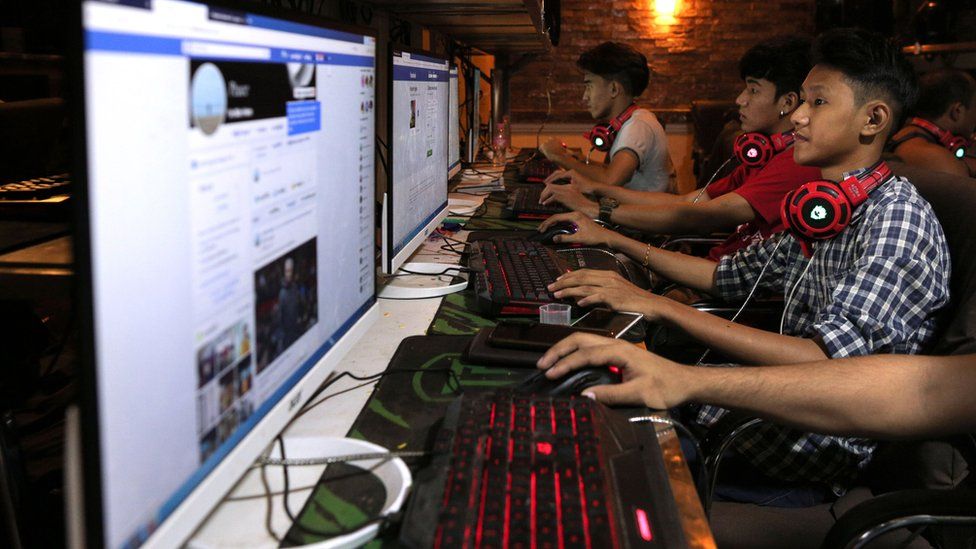Myanmar coup: How Facebook became the ‘digital tea shop’

It is widely said that, in Myanmar, Facebook is the internet, so when the military asked for it to be blocked for the sake of “stability” it sent a shockwave through the country.
As Myanmar’s military seized control in a coup on 1 February, many Burmese watched events unfold on Facebook in real-time. It’s the primary source of information and news, where businesses operate and how authorities disseminate vital information.
Its ubiquity has meant it plays an outsized role in what information is amplified and its real-world impact.
Why is Facebook so popular in Myanmar
Up until the mid-2000s most people did not have access to the internet or mobile phones under the military-run government.
A sim card could cost hundreds of dollars with the state-owned telecommunications firm, MPT, so mobile penetration was one of the lowest in the world.
The country started to liberalise in 2011 and by 2014 two telecommunications companies had been given permission to enter the country, Norway’s Telenor and Qatar’s Oredoo.
It was the first time many Burmese had access to any kind of telecommunications and led to a rapid adoption of mobile phones as prices plummeted.
“Myanmar came online more or less overnight and almost all at once,” says Richard Horsey, an independent political analyst based in the biggest city Yangon.
Entering the country in 2010, Facebook initially allowed its app to be used without incurring data charges, so it gained rapid popularity. It would come pre-loaded on phones bought at mobile shops and was a cultural fit.
“During the years of censorship, if you wanted to know what was going on you had to go down to the tea shop and chat with people. When Facebook came along it gelled with that way of doing things – a digital tea shop,” Mr Horsey says.
It is now used by more than half of the country’s population of 54 million people, the company says.
Why has it been controversial?
In 2012 communal violence broke out in Rakhine state between the Buddhist majority and minority Rohingya Muslims.
And there were fears that social media – namely Facebook – had the ability to amplify those existing tensions resulting in violence.
As an example, in 2014 an extremist and anti-Muslim monk, Ashin Wirathu, shared a post alleging that a Buddhist girl had been raped by Muslim men. It went viral on Facebook.
Days later a mob descended on those accused of being involved and two people died in the ensuing violence. A police investigation later found that the monk’s accusation had been completely fabricated.
UN human rights investigators have since concluded that hate speech on Facebook played a key role in fomenting violence in Myanmar. The company admitted it had failed to prevent its platform being used to “incite offline violence” in Myanmar.
“Facebook was complicit in a genocide. There were already signs and strong calls for Facebook to handle the incitement of violence on the platform but their inaction really contributed to the fanning of violence in Myanmar,” says Rin Fujimatsu from research and advocacy group Progressive Voice.
Since then the platform has taken some steps to actively remove hate speech and ban military officials.
In 2018, Facebook banned Min Aung Hlaing, the leader of Myanmar’s armed forces and the man who led the coup this week. It also banned the army’s television channel Myawaddy from its platform.
So why is it being blocked now?
The military has asked internet providers to block the platform to ensure stability.
That throws into question the impact on the civil disobedience campaign against the coup, businesses and also the dissemination of public health advice on Covid-19 which happens largely on Facebook.
“It’s really a violation of people’s right to information and expression as well as freedom of speech – this is really crucial at a time when information is necessary to keep themselves safe from the pandemic,” says Ms Fujimatsu.
People are now scrambling to find alternatives. Other social media and messaging platforms have seen a surge in users in Myanmar including Twitter, Signal and offline messaging app Bridgefy after the military temporarily disrupted internet access.
Facebook has said: “We urge authorities to restore connectivity so that people in Myanmar can communicate with family and friends and access important information”.
It has also said it is now treating the current situation in Myanmar as an emergency and is actively removing content that praises or supports the coup.
The platform is a key factor in the civil disobedience campaign. Many users have changed their profile pictures to show support for the political party of deposed civilian leader Aung San Suu Kyi.
And given its history in the country, there is a sentiment that Facebook has an obligation to protect human rights and freedom of expression there.
So might this chip away at Facebook’s importance? Observers think it’s unlikely.
“People have also seen how easy it is to crack down on Facebook and how fragile communication is especially under the current military coup, so they will diversify where they get their information and how they communicate with each other in order to show their defiance,” says Ms Fujimatsu.
But ultimately she and others believe Facebook is too integrated into the daily lives of people of Myanmar for people to move away from it.

